

rapiddetoxhelpline
Rapid detox helpline is the fastest way to get relief from drug addiction. It takes 10 to 14 days, mostly to recover. This is a painless treatment with rapid effect. After the addictive substance has been flushed out of the body during detox and an individual is screened for all possible diagnoses, treatment is often necessary to keep someone sober. Many healthcare centers and facilities provide treatment for those walking away from addiction through the combination of various therapeutic options, such as cognitive behavioral therapy (CBT), medication when necessary and other helpful treatment methods. Our helpline is available 24/7. Contact the Rapid Detox Helpline online or call 866-403-5591.
6 effective ways to cope with divorce/separation. How to deal with an aggressive partner. 6 Effective Ways to Cope with Divorce/Separation. How to Deal With an Aggressive Partner. Nearly 33 percent women and 25 percent men in the United States have experienced, physical violence, rape, and/or stalking by an intimate partner in their lifetime.

In addition, around 74 percent of all murder-suicides involved an intimate partner including ex-spouse, spouse, common-law spouse, or boyfriend/girlfriend). Of these, 96 percent were women killed by their intimate partners. Verbal and physical abuse from an aggressive partner is a common problem among married and cohabitating couples in the United States.
Partner aggression that comprises both physical (e.g., grabbing, shoving) and verbal (e.g., insulting) behaviors has been associated with a number of physical (chronic pain and sexually transmitted infections among others), and mental health problems (such as anxiety, and depressive symptoms, substance abuse and dependence). Therefore, it is important to deal with partner aggression before it leaves permanent scars. Handle the Situation Calmly Avoid Conflict Seek Help. Thank God, Opioid Withdrawal Is Manageable. Take the Detox Route. Opiates or opioids is a class of drugs used to treat moderate pain, which includes drugs like Hydrocodone (Vicodin), Hydromorphone (Dilaudid), Codeine, Heroin, Morphine, Oxycodone (Percocet or Oxycontin), Methadone and Meperidine (Demerol).
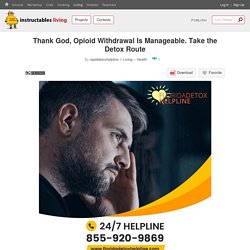
These drugs are known as effective painkillers that have been prescribed for the treatment of chronic, non-cancer pain, such as back pain or osteoarthritis. However, the problem is the use of these drugs is associated with dependence, misuse and withdrawal symptoms. Stopping or cutting back on these drugs after for a prolonged period may produce a number of symptoms, a condition called a withdrawal.
Managing Withdrawal Symptoms is the major challenge for people undergoing treatment as it can cause some discomfort and stimulate drug-seeking behaviour patients with chronic, non-cancer pain (CNCP) and opioid use disorder. However, recent studies have suggested detoxification as an effective strategy to complement treatment for opioid addiction: Thank God, Opioid Withdrawal Is Manageable. Take the Detox Route. Opiates or opioids is a class of drugs used to treat moderate pain, which includes drugs like Hydrocodone (Vicodin), Hydromorphone (Dilaudid), Codeine, Heroin, Morphine, Oxycodone (Percocet or Oxycontin), Methadone and Meperidine (Demerol).
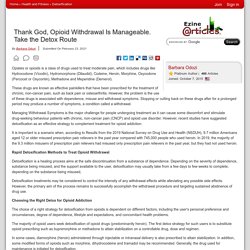
These drugs are known as effective painkillers that have been prescribed for the treatment of chronic, non-cancer pain, such as back pain or osteoarthritis. However, the problem is the use of these drugs is associated with dependence, misuse and withdrawal symptoms. Stopping or cutting back on these drugs after for a prolonged period may produce a number of symptoms, a condition called a withdrawal. Managing Withdrawal Symptoms is the major challenge for people undergoing treatment as it can cause some discomfort and stimulate drug-seeking behaviour patients with chronic, non-cancer pain (CNCP) and opioid use disorder.
Lifelong Drinking May Cause a Decline in Brain Health. While mental health related adverse effects of alcohol consumption are well known, a new research has underlined three key time periods in life when alcohol use can cause the maximum damage.
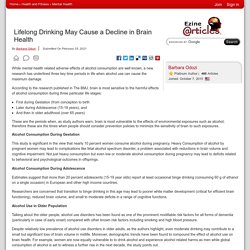
According to the research published in The BMJ, brain is most sensitive to the harmful effects of alcohol consumption during three particular life stages: First during Gestation (from conception to birth Later during Adolescence (15-19 years), and And then in older adulthood (over 65 years) These are the periods when, as study authors warn, brain is most vulnerable to the effects of environmental exposures such as alcohol; therefore these are the times when people should consider prevention policies to minimize the sensitivity of brain to such exposures. Alcohol Consumption During Gestation This study is significant in the view that nearly 10 percent women consume alcohol during pregnancy. Lifelong Drinking May Cause a Decline in Brain Health. While mental health related adverse effects of alcohol consumption are well known, a new research has underlined three key time periods in life when alcohol use can cause the maximum damage.
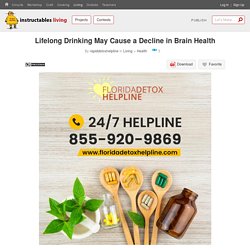
According to the research published in The BMJ, brain is most sensitive to the harmful effects of alcohol consumption during three particular life stages: First during Gestation (from conception to birthLater during Adolescence (15-19 years), and And then in older adulthood (over 65 years) These are the periods when, as study authors warn, brain is most vulnerable to the effects of environmental exposures such as alcohol; therefore these are the times when people should consider prevention policies to minimize the sensitivity of brain to such exposures. Alcohol Consumption During Gestation This study is significant in the view that nearly 10 percent women consume alcohol during pregnancy. Rapid Detox From Opiates, Rapid Opiates Detoxification, Substance Abuse Treatment. Detoxifying one’s body from alcohol, opiates or any other substances that may be abused is absolutely necessary in order to begin the treatment of addiction or any other related conditions.
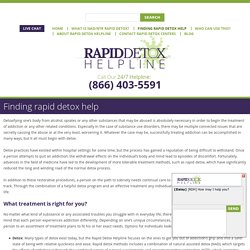
Especially in the case of substance use disorders, there may be multiple connected issues that are secretly causing the abuse or at the very least, worsening it. Whatever the case may be, successfully treating addiction can be accomplished in many ways, but it all must begin with detox. Detox practices have existed within hospital settings for some time, but the process has gained a reputation of being difficult to withstand. Once a person attempts to quit an addiction, the withdrawal effects on the individual’s body and mind lead to episodes of discomfort.
Fortunately, advances in the field of medicine have led to the development of more tolerable treatment methods, such as rapid detox, which have significantly reduced the long and winding road of the normal detox process. Want To Quit Drug Addiction?